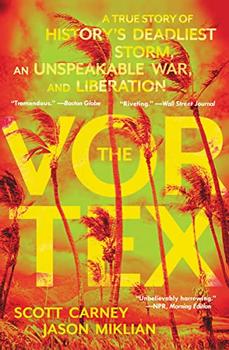Summary | Excerpt | Reviews | Beyond the Book | Readalikes | Genres & Themes | Author Bio

A True Story of History's Deadliest Storm, an Unspeakable War, and Liberation
by Scott Carney , Jason Miklian
This was freedom.
He crossed a busy intersection and turned onto a tree-lined boulevard with British-era brick buildings and bungalows. When he entered the university gate, he made out the minaret of one of East Pakistan's only Sikh temples: a structure called a gurdwara.
He parked a few feet away from an enormous banyan tree that stood in front of the admissions building. The tree was a sprawling monolith, with an inviting canopy that stretched out for twenty feet in every direction from its dense tangle of trunks and branches. Some people believed it was as old as the Buddha himself—a 2,500-year-old relic that perfectly symbolized the melting pot of religions, politics, and ideas that swirled around the people of the Ganges delta. After a hundred generations of societal upheaval and rebirth, the tree now stood at the epicenter of Dacca University's political scene. Students gathered daily under its branches to make impassioned speeches about whatever political point took their fancy, and today was no exception.
Hafiz caught sight of a rakish young man in front of the crowd. He sported a wispy beard, long white kurta, and Western blue jeans—the de facto uniform of a certain type of political rabble-rouser. He was maybe eighteen years old and fashioned himself something of an orator. He raised his fist in the air and yelled with a passion reserved for people who took too many sociology classes. Hafiz didn't listen. He didn't need to. He was sure it was the same old complaints. It wasn't that Hafiz was against the cause, rather he thought there were better ways to spend his time. The kid had probably read Marx or Lenin and now squawked into the breeze about Bengali independence or how no one wanted Urdu as the national language.
It didn't take a PhD in history to realize that Pakistan was in trouble. For thousands of years, South Asia was the center of religious, philosophical, and artistic movements, as well as wars between kingdoms. It was also one of the richest regions on earth. In 1757, the British took control of those riches and brought the subcontinent's imponderable diversity under one giant territory called India.
What worked out well for the colonizers didn't sit well with the colonized. The British policy of "divide and rule" set opposing segments of society against one another, cementing differences between Hindus and Muslims that would shape their political destiny. While British India claimed to be secular, nobody was under the illusion that Hindus and Muslims were treated as equals, especially when it came to well-connected Hindu landlords and their Muslim subjects. The wealth disparities were so great that some Hindus built immense marble palaces while tens of thousands of Muslim subjects on their land lived on the brink of starvation.
The idea of Pakistan arrived in the early 1930s, taking the political scene by storm. The name wasn't some ancient tribal homage; it was simply an acronym for the country's biggest provinces and ethnic groups, all located in the western part of British India: P for Punjab and Pashtuns, A for the Afghans, K for Kashmir, S for Sindh, and TAN for Balochistan. Pakistan's founding father, Muhammad Ali Jinnah, promised that the new country would be a home for all Muslims—a land of equality and true democracy.
In 1947, just two years after the end of World War II, during which Indian troops—Muslims and Hindus together—fought in Europe for the good guys, an anti-colonial independence movement won freedom from the British. Mahatma Gandhi, the most visible leader of the movement, favored a united India, while Jinnah believed that the Muslims should have their own nation. Seeing the writing on the wall and too broke after the war to do anything about it anyway, the British split the subcontinent across religious lines and relinquished their colonial Crown Jewel. They called the process "Partition." Hindus made up the majority in the new country of India, and Muslims claimed most of Pakistan. The haphazard redrawing of a society divided the territory in a way that drove tens of millions of panicked migrants over the new borders in the first week of its existence, triggering riots and violence that left more than a million people dead. Partition also cleaved Bengal in two, with the cultural capital of Calcutta going to India and Dacca parked in Pakistan.
Excerpted from The Vortex by Scott Carney and Jason Miklian. Copyright © 2022 by Scott Carney and Jason Miklian. Excerpted by permission of Ecco. All rights reserved. No part of this excerpt may be reproduced or reprinted without permission in writing from the publisher.
A million monkeys...
Click Here to find out who said this, as well as discovering other famous literary quotes!
Your guide toexceptional books
BookBrowse seeks out and recommends the best in contemporary fiction and nonfiction—books that not only engage and entertain but also deepen our understanding of ourselves and the world around us.